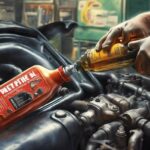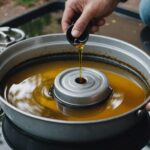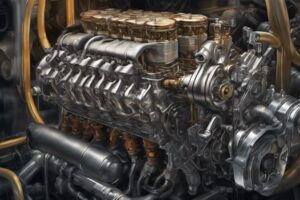When the check engine light illuminates on a vehicle’s dashboard, it signals that the car’s computer system has detected an issue within the engine or its peripherals.
One possible culprit behind this alert is the engine code P0172, indicating that the fuel mixture is too rich in the car’s bank 1, which is the side of the engine where the number one cylinder is typically located.
A rich condition means that there is an excessive amount of fuel in proportion to air in the combustion chamber. This imbalance can lead to a host of problems affecting the vehicle’s performance, fuel efficiency, and emissions output.
Addressing a P0172 trouble code promptly is important to maintain the vehicle’s performance and to prevent potential damage to components such as spark plugs, pistons, and catalytic converters.
Understanding Engine Code P0172
The P0172 code is indicative of a System Too Rich (Bank 1) condition in the engine’s air-fuel mixture ratio. It signals that the Powertrain Control Module (PCM) has detected a richer than ideal air-fuel mixture in Bank 1 – the side of the engine with cylinder number one. This imbalance implies that there is too much fuel or too little air flowing into the combustion chamber.
What Are the Possible Causes of This Engine Code?
There could be multiple contributing factors to the presence of a P0172 code. Key causes include:
- Malfunctions in the fuel system, such as a leaking fuel injector or faulty fuel pressure regulator, resulting in excessive fuel delivery.
- Faults in oxygen sensors or air-fuel sensors, leading to incorrect measurement of the air-fuel mixture.
- A compromised mass air flow (MAF) sensor that inaccurately measures the amount of air entering the engine.
- Vacuum leaks which decrease the pressure within the engine, altering the air to fuel ratio.
- Obstructions in the air filter, constricting the flow of air into the engine.
What Are the Common Symptoms of This OBD Code?
When a vehicle exhibits a P0172 code, the following symptoms may be observed:
- Decreased fuel economy due to the misuse of fuel.
- Presence of black smoke or soot in the vehicle’s exhaust, signifying incomplete combustion.
- Engine misfiring, which may be sensed as rough idling or difficulty in starting.
- Possible damage to the catalytic converter, as it attempts to process unburned fuel.
Diagnostic and Repair Instructions
How to Diagnose the Code
To properly diagnose the P0172 code, follow a methodical approach to rule out common mistakes and identify the root cause of the rich fuel mixture. Begin with a visual inspection of the engine’s air intake system, checking for loose or damaged components that might contribute to rough idling or a loss of engine power. Then proceed with these steps:
- Inspect the air filter: A clogged air filter can restrict airflow, leading to a rich mixture. Replace the air filter if it’s dirty.
- Check the fuel pressure: Perform a fuel pressure test to ensure the fuel delivery system maintains the correct pressure. Anomalies may indicate a faulty fuel regulator or pump.
- Evaluate the fuel trim data: Using a scan tool, examine the short-term and long-term fuel trim values. Deviations might suggest issues with fuel delivery or a lean fuel mixture correction attempt by the PCM.
- Assess the MAF sensor: A dirty mass air flow sensor can inaccurately measure incoming air, contributing to a rich mixture. Clean or replace the MAF sensor if needed.
- Scan O2 sensors: Faulty O2 sensors can send incorrect data to the PCM, leading to improper fuel mixture adjustments. Diagnose the sensors and replace if malfunctioning.
- Examine the PCV system: The Positive Crankcase Ventilation (PCV) system should be inspected for any signs of malfunction, which can impact the air-fuel ratio.
How to Fix This OBD Code
After diagnosing the P0172 code, perform the necessary repairs to resolve the rich mixture condition:
- Replace malfunctioning sensors: Install new O2 or MAF sensors if they were found to be defective during diagnosis.
- Repair fuel delivery components: If the fuel pressure test indicated issues, replace or repair malfunctioning fuel pumps, fuel injectors, or regulators.
- Address temperature sensor issues: A faulty coolant temperature sensor or issues with the cooling system should be repaired to prevent false rich mixture readings.
- Fix PCV system errors: Resolve any problems found within the PCV system to maintain proper engine ventilation and air-fuel balance.
- Update or reflash PCM software: If necessary, update the PCM software to ensure accurate fuel mixture computations.
While addressing the P0172 code, avoid common pitfalls such as replacing parts without thorough diagnosis or ignoring potential causes like temperature or manifold absolute pressure sensors. Keep in mind, the expenses associated with these repairs can vary significantly, so it’s important to address the issues correctly the first time to prevent further costs or potential engine damage.
Are the Causes and Fixes for Engine Code P0172 Similar to Those for Engine Code P0113?
When comparing the causes and fixes for engine code P0172 and engine code P0113, there are some similarities but also distinct differences. The engine code P0113 implications and solutions are related to the intake air temperature sensor, whereas the P0172 code is linked to a rich fuel condition in the engine.
Additional Vehicle Specific Troubleshooting
When the P0172 OBD-II trouble code appears, indicating that engine bank 1 is experiencing a mixture that is too rich, one must consider the specific troubleshooting for the vehicle brand.
For example, a Ford might present this code when there’s a problem with its vacuum hoses, which could cause an imbalance in the air and gasoline mixture. Mazda vehicles, on the other hand, may trigger this code due to a faulty fuel pressure regulator.
Mini vehicles encountering the P0172 and P0175 codes—the latter indicating that engine bank 2 is too rich—should be checked for issues such as a stuck open thermostat or contamination in the fuel system.
Frequently Asked Questions
In addressing the P0172 trouble code, one uncovers a variety of concerns related to overly rich fuel mixtures. These FAQs aim to provide concise, expert answers.
What are the potential reasons for an engine running too rich as indicated by code P0172?
An engine running too rich, as highlighted by the P0172 code, could be due to excess fuel delivery or insufficient oxygen supply. Malfunctions might include a faulty mass airflow sensor, leaking fuel injectors, or a malfunctioning oxygen sensor.
Can driving a vehicle with code P0172 lead to further damage?
Continuing to operate a vehicle presenting the P0172 code can cause harm over time, including but not limited to, damage to spark plugs, catalytic converters, and even the pistons.
What are common troubleshooting steps to correct code P0172 on different car models?
Troubleshooting steps for the P0172 code typically involve inspecting and possibly replacing fuel system components, checking for air leaks in intake manifolds, and ensuring correct operation of exhaust sensors.
What is the typical cost range for repairing an issue related to code P0172?
Repair costs for issues related to P0172 vary widely, depending on the root of the problem and labor rates. Minor fixes could be under $100, while more significant repairs like fuel injector replacement may exceed several hundred dollars.
How does code P0172 relate to Bank 1 of the engine?
Code P0172 is specific to Bank 1, which refers to the side of the engine where the number one cylinder is located. It indicates that the air-fuel mixture in this bank is too rich.
What are the differences between codes P0172 and P0175, and how are they resolved?
While both codes P0172 and P0175 indicate a rich condition, P0172 is specific to Bank 1, and P0175 refers to Bank 2. Resolution involves similar steps such as checking fuel delivery and air intake systems, but on the respective banks of the engine.
As an Amazon Associate we earn from qualifying purchases.









I’ve noticed my car’s fuel economy has significantly decreased recently, and there’s occasionally black smoke from the exhaust. Could these be signs of a P0172 code, and if so, what initial checks can I perform myself before taking it to a mechanic?
I’ve noticed my car’s fuel efficiency has dropped significantly and there’s a hint of black smoke from the exhaust. Could this be related to the P0172 code, and how urgent is it to address this problem?